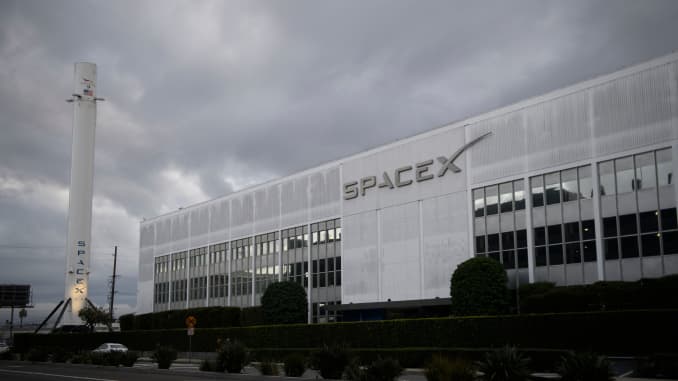- SpaceX should be forced to comply with a subpoena from the Department of Justice as part of its probe into whether Elon Musk’s company illegally discriminated against foreign applicants, a judge recommended Monday.
- The judge’s report described “several” federal investigations into the aerospace giant’s hiring practices.
- The report rejected SpaceX’s argument that the subpoena constituted “government overreach.”

“Further, there is an insufficient basis to conclude that the subpoena
is overbroad or presents an undue burden to SpaceX,” said the report in
central California federal court.
If SpaceX files no objection by April 12, Wilner’s recommendation will be sent to a federal district judge, who will deliver a ruling and deal with all other matters in the case.
SpaceX did not immediately respond to CNBC’s request for comment on the court filing. The DOJ did not immediately provide comment.
The IER, part of the Justice Department’s civil rights division, launched a probe in May to determine whether SpaceX “had engaged in an individual violation or pattern or practice” of hiring discrimination based on citizenship, in violation of U.S. law.
The investigation was based on a complaint that “on or about March 10, 2020, during the Charging Party’s interview for the position of Technology Strategy Associate, SpaceX made inquiries about his citizenship status and ultimately failed to hire him for the position because he is not a U.S. citizen or lawful permanent resident,” DOJ attorneys said in a legal memorandum filed in California federal court in January.
IER obtained a subpoena in October for a slew of documents from SpaceX, the memo said. The company filed a petition that month to revoke the subpoena, but that request was revoked, and SpaceX was ordered to comply.
In mid-December SpaceX acknowledged that order, but told IER that it “does not intend to produce any additional information in response to the administrative subpoena,” according to the DOJ’s memo, which asked the federal court to force compliance with the subpoena.
In a fiery response last month, SpaceX called the investigation “the very definition of government overreach.”
The company protested at what it called an attempt by IER to “bootstrap” one applicant’s “frivolous” allegation “into the wide-ranging (and expanding) pattern-or-practice investigations the agency is now pursuing.”
But Wilner on Monday disagreed. “SpaceX has not convincingly carried its burden of proving that the IER subpoena is improperly overbroad,” he wrote in his recommendation.
Musk, the multibillionaire CEO of SpaceX and Tesla, has a long history of clashing with the government.
In 2018, the Securities and Exchange Commission charged Musk with fraud, alleging he misled people by tweeting he was thinking about taking Tesla private, assuring that he had the “funding secured.”
Musk and Tesla in a settlement agreement both agreed to pay a $20 million fine.
During early days of the coronavirus pandemic, Musk sounded off about government shelter-in-place orders, ranting on a Tesla earnings call about the “fascist” rules.
— CNBC’s Dan Mangan contributed to this report.
The IER, part of the Justice Department’s civil rights division, launched a probe in May to determine whether SpaceX “had engaged in an individual violation or pattern or practice” of hiring discrimination based on citizenship, in violation of U.S. law.
The investigation was based on a complaint that “on or about March 10, 2020, during the Charging Party’s interview for the position of Technology Strategy Associate, SpaceX made inquiries about his citizenship status and ultimately failed to hire him for the position because he is not a U.S. citizen or lawful permanent resident,” DOJ attorneys said in a legal memorandum filed in California federal court in January.
IER obtained a subpoena in October for a slew of documents from SpaceX, the memo said. The company filed a petition that month to revoke the subpoena, but that request was revoked, and SpaceX was ordered to comply.
In mid-December SpaceX acknowledged that order, but told IER that it “does not intend to produce any additional information in response to the administrative subpoena,” according to the DOJ’s memo, which asked the federal court to force compliance with the subpoena.
In a fiery response last month, SpaceX called the investigation “the very definition of government overreach.”
The company protested at what it called an attempt by IER to “bootstrap” one applicant’s “frivolous” allegation “into the wide-ranging (and expanding) pattern-or-practice investigations the agency is now pursuing.”
But Wilner on Monday disagreed. “SpaceX has not convincingly carried its burden of proving that the IER subpoena is improperly overbroad,” he wrote in his recommendation.
Musk, the multibillionaire CEO of SpaceX and Tesla, has a long history of clashing with the government.
In 2018, the Securities and Exchange Commission charged Musk with fraud, alleging he misled people by tweeting he was thinking about taking Tesla private, assuring that he had the “funding secured.”
Musk and Tesla in a settlement agreement both agreed to pay a $20 million fine.
During early days of the coronavirus pandemic, Musk sounded off about government shelter-in-place orders, ranting on a Tesla earnings call about the “fascist” rules.
— CNBC’s Dan Mangan contributed to this report.
沒有留言:
張貼留言